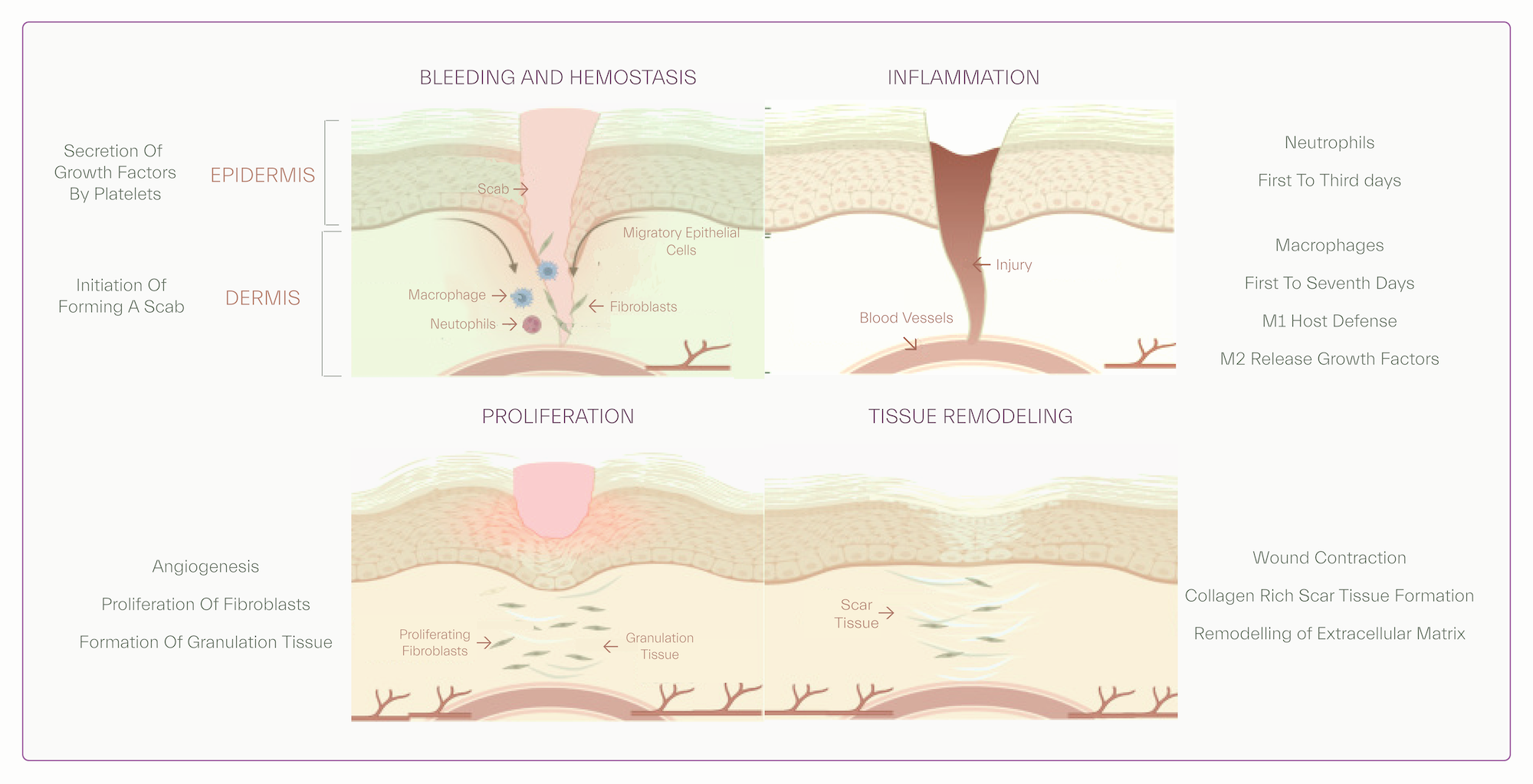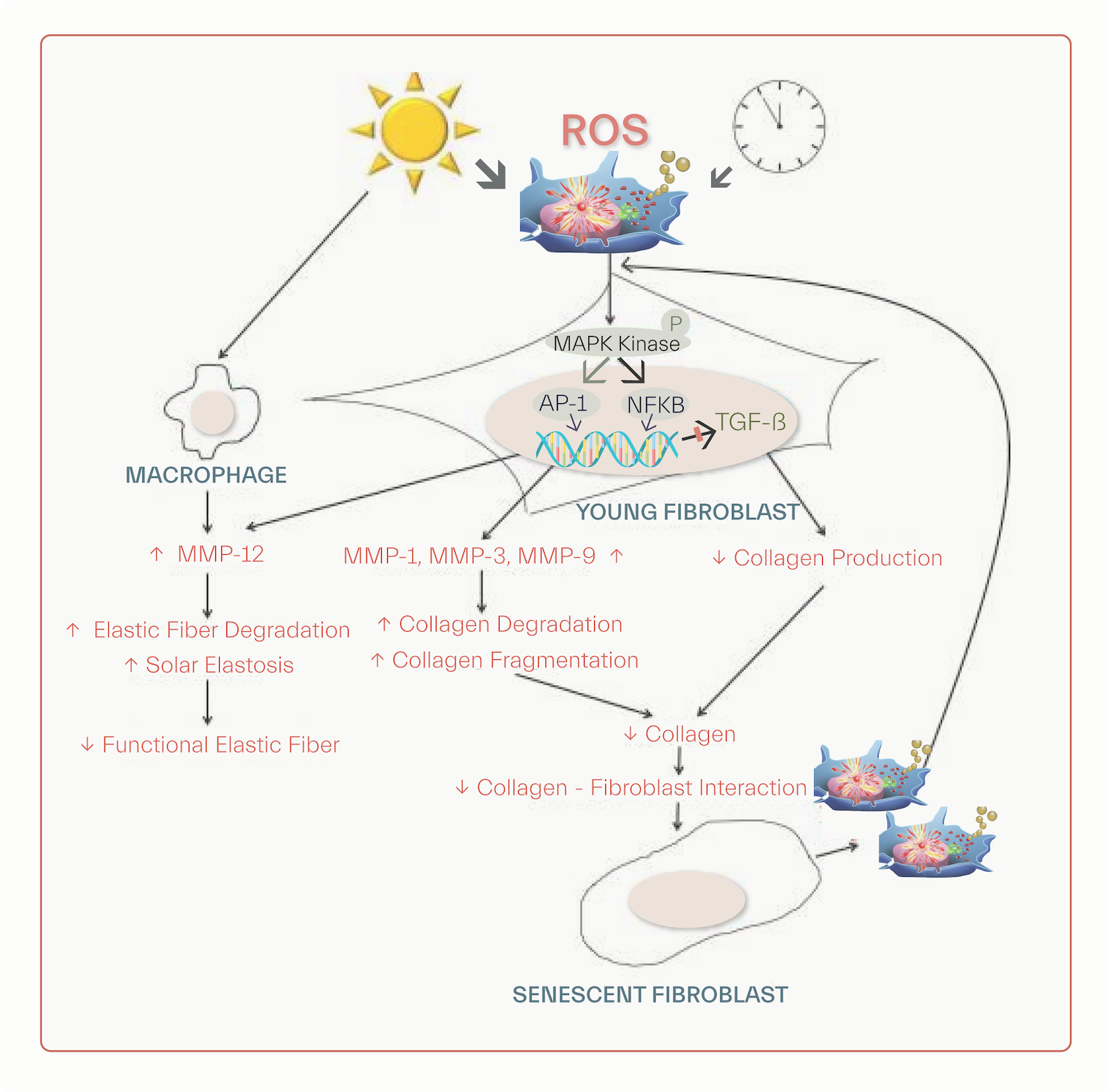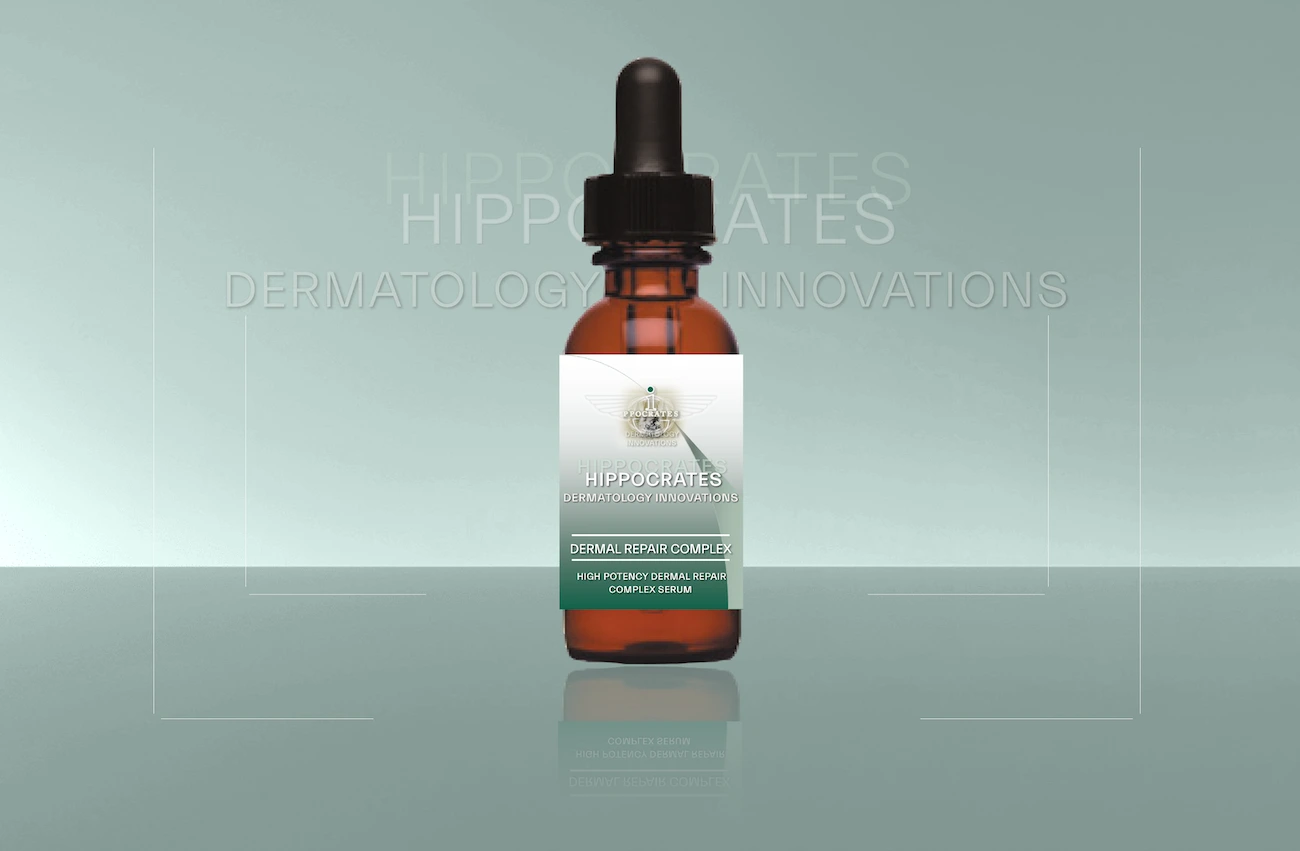

Deterioration of collagen and other constituents of skin’s connective tissue in the form of degradation and fragmentation is characteristic of skin aging process. Ambition of the firming serum, dermal repair, directs toward attenuation of processes invoking cutaneous senescence or the ones which grow indolent consequent to aging. Starts as early as age 25, the skin aging process slowly and continuously causes several changes in appearance and characteristics of the skin. The following are among these changes:
While attempt have been made in medical research for tissue regeneration using multipotent stem cells, there always have been understated risks of tumor formation and immune system rejection associated with their utilization. As a result, paracrine substances by the same mesenchymal cells have been employed with clearly more substantial safety profiles that can modulate tissue regeneration and dermal repair. A non-cellular approach using growth factors and extracellular vesicles have been more successfully adventured to accomplish a task with results unequivocal to what long have been experienced.


These criteria all met in Day Treatment, dermal repair complex, which is a growth-factor based serum for skin firming. In fact, dermal repair complex serum is fortified with bioflavanoids to combat skin ‘s lipid peroxidation integrated into a firming serum with ascorbic acid in the most desirable form, ascorbyl phosphate. This serum works in synergy with night serum, a skin resurfacing serum which primarily points to wrinkles and facial lines.

The process of skin aging is a complex, multifactorial phenomenon that involves the gradual deterioration of the skin’s structural integrity. This deterioration primarily manifests as the degradation and fragmentation of collagen, elastin, and other essential components of the skin’s connective tissue. These processes collectively contribute to the characteristic signs of aging, including the formation of fine lines, sagging, and a loss of skin elasticity. In response to these inevitable changes, significant attention has been directed toward developing dermal repair strategies, particularly those aimed at attenuating or reversing the effects of cutaneous senescence. This discussion will explore the mechanisms involved in skin aging, critically assess current approaches to dermal repair, and propose key questions for future research to improve the efficacy and safety of skin regeneration treatments.
The aging of the skin is a progressive process that begins as early as age 25. Although the visible effects of skin aging become more prominent with advancing age, cellular and molecular changes start to occur much earlier. The skin’s ability to renew itself diminishes with age, which results in slower skin turnover and delayed wound healing. This deceleration of cellular regeneration leads to the gradual formation of fine lines, wrinkles, and dull skin, all of which are hallmark indicators of the aging process.
A critical aspect of skin aging is the breakdown of the collagen and elastin fibers in the dermal matrix. These proteins provide structural support and elasticity to the skin. As their quantity and quality decline, the skin loses its firmness, strength, and resilience. In addition to collagen degradation, a reduction in glycosaminoglycans, which are essential for moisture retention, results in drier skin. This loss of moisture contributes to the overall thinning and textural changes observed in aging skin. Moreover, the reduction in the number of blood vessels with age impairs the delivery of essential oxygen and nutrients to the skin, leading to a duller complexion.
The loss of subcutaneous fat, which typically occurs with aging, contributes to the appearance of volume loss and a less plump skin texture. Additionally, external factors such as stress and the force of gravity further exacerbate the sagging of the skin, leading to noticeable changes in the skin’s contour and structure. These cumulative effects underscore the complexity of skin aging and highlight the need for multifaceted treatments that address the diverse mechanisms at play.
The primary aim of modern dermal repair therapies is to counteract the effects of cutaneous senescence by stimulating the skin’s regenerative capacity, particularly in the context of collagen and elastin synthesis. Various approaches have been explored, with some focusing on cellular regeneration and others adopting non-cellular regeneration techniques.
One area of research has focused on the use of multipotent stem cells for tissue regeneration. Stem cells have the potential to differentiate into a variety of cell types, including those involved in the synthesis of collagen and elastin. These cells have shown promise in preclinical studies for their ability to repair and rejuvenate aged skin. However, their clinical application has been limited due to concerns about tumor formation and immune rejection, both of which represent significant safety risks. While stem cell-based therapies hold significant potential, the long-term safety and efficacy of such treatments remain uncertain, requiring further investigation.
As an alternative to cellular regeneration, researchers have turned to growth factors and extracellular vesicles (EVs) derived from mesenchymal stem cells. These non-cellular therapies have shown more substantial safety profiles and have proven effective in modulating tissue regeneration and promoting dermal repair. Growth factors, such as transforming growth factor-beta (TGF-β) and epidermal growth factor (EGF), play crucial roles in stimulating collagen synthesis, improving skin elasticity, and enhancing cellular turnover. EVs, which contain a cargo of proteins, lipids, and RNA, have also demonstrated the ability to modulate cellular communication, enhance tissue repair, and reduce inflammation. These advancements point to the potential of non-cellular therapies as safer and more scalable solutions for skin rejuvenation.
Among the various ingredients used in dermal repair, Vitamin C—specifically in its active form, L-ascorbic acid—has long been recognized for its dual action in free radical neutralization and collagen synthesis. As an antioxidant, Vitamin C helps neutralize free radicals generated by environmental stressors, such as UV radiation and pollution, thereby reducing oxidative stress. In addition to its antioxidant properties, Vitamin C directly influences collagen biosynthesis by stimulating the production of procollagen and collagen in dermal fibroblasts.
However, while Vitamin C has demonstrated substantial benefits for the skin, it is important to note that its effectiveness is significantly enhanced when included in more complex formulations. Vitamin C, in isolation, is unlikely to provide meaningful results in the treatment of aging skin. Instead, it is the combination of Vitamin C with other ingredients—such as peptides, hyaluronic acid, and ferulic acid—that optimizes its therapeutic effects. These complex formulations not only improve the stability and bioavailability of Vitamin C but also synergistically enhance its ability to restore skin vitality, firmness, and elasticity.
While advancements in dermal repair have provided several promising treatment options, several questions remain unanswered and warrant further exploration in future studies:
What are the long-term safety and efficacy profiles of non-cellular regeneration therapies, such as growth factors and extracellular vesicles, in the treatment of aging skin?
While these therapies show promise, the long-term effects on skin health and their potential impact on systemic physiology need to be investigated further.
Can combination therapies that integrate stem cells, growth factors, and antioxidants provide superior results in dermal repair, particularly for patients with advanced signs of aging?
The use of multi-modal approaches could enhance the regenerative potential of treatments, but studies examining the synergistic effects of these combinations are limited and require more focused investigation.
How can we improve the bioavailability and stability of Vitamin C in topical formulations to enhance its effectiveness in collagen synthesis and skin rejuvenation?
Vitamin C’s instability in aqueous solutions remains a challenge. Future studies could explore novel delivery systems, such as liposomes or nanoencapsulation, to improve its stability and absorption of a firming serum in the skin.
What role do extracellular vesicles (EVs) play in the modulation of aging-related changes in the dermis, particularly in addressing the loss of collagen, elastin, and subcutaneous fat?
EVs have been shown to promote tissue repair, but their exact mechanism in addressing the multifaceted nature of skin aging is still not fully understood. Further research could explore the potential of EVs in targeting multiple skin layers simultaneously.
How can we personalize dermal repair treatments based on individual genetic, epigenetic, and environmental factors to achieve more effective results in skin rejuvenation?
Personalized approaches that consider genetic predispositions, skin types, and environmental exposures could provide more tailored and effective treatments. Further research could focus on identifying biomarkers of aging to guide personalized therapies.
What are the potential risks and other implications of using stem cells or stem cell-derived products in the context of dermal repair in a firming serum or a similar vehicle for aging skin?
Although stem cell therapies offer significant promise, their application raises important ethical and safety concerns that require careful consideration in clinical settings. Research into the ethical implications and regulatory frameworks of these therapies is essential.